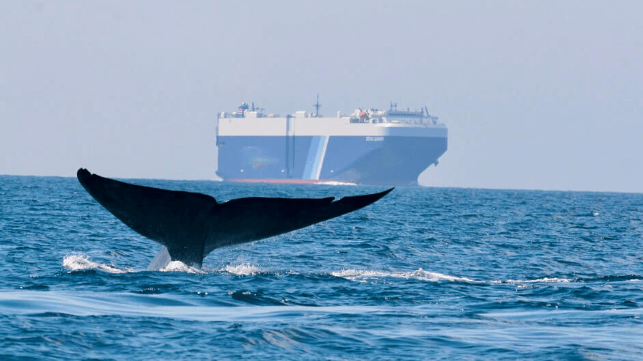Shipping Companies Boost Cooperation With California Slowdown Program

Shipping companies showed an increased commitment to protecting whales off the coast of California last year, according to NOAA's Blue Whales and Blue Skies program - even during a booming container freight market, when operators had strong incentives to speed up.
The initiative asks participating vessel operators to transit at 10 knots or less near the state's busiest seaports from mid-May to mid-December, when whale activity and air pollution concerns are at their seasonal peaks. Traveling this speed reduces the risk of a fatal whale strike by an estimated 44 percent, and it cuts stack emissions in areas with longstanding air quality challenges.
According to the program, participating ships transiting the Southern California voluntary speed reduction zone - a stretch of about 200 nautical miles between San Miguel Island and LA/Long Beach - chose to operate at the requested speed limit of 10 knots or less for 79 percent of all miles traveled last year. The organizers report that adherence has risen every season, and has come a long way since the 21 percent compliance recorded in this region in 2017.
Cooperation also rose markedly last year off San Francisco, where the initiative has designated a set of corridors covering the traffic separation scheme (TSS) and extending north as far as Point Arena. In 2022, participating shipping companies stayed below 10 knots in this area about 72 percent of the time, up from 60 percent in 2021.
Eight participating companies achieved 85 percent compliance or better, the top-tier category. This is the largest number ever. These leaders included OOCL (with 95 percent adherence), MSC, Swire, Yang Ming, COSCO, NYK Ro-Ro, Wallenius Wilhelmsen and CSL.
Overall, participating ships complied on nearly 260,000 out of 344,000 nm transited during the year (approximately 75 percent). This resulted in the elimination of about 920 tons of NOx and 32,000 tonnes of GHG emissions when compared with baseline operations - a 27 percent improvement on vessel climate performance relative to baseline.

that matters most
Get the latest maritime news delivered to your inbox daily.
The program is not the only voluntary speed cut initiative in California. A longstanding MOU between the Ports of LA and Long Beach and the shipping community requests operators to reduce speed to 12 knots within 20-40 nm of the port. Port of LA reports exceptionally high compliance with this voluntary measure, above 90 percent.
The Center for Biological Diversity has petitioned NOAA to make the vessel speed reductions mandatory on all transit miles in the covered areas, year-round. Noncooperating operators would also be required to participate for the first time, resulting in additional reductions in whale strike risk and emissions. NOAA declined the Center's petition in 2022, citing increasing compliance with the voluntary program, as well as surveys that show West Coast whale populations recovering despite the impact of ship strikes.
